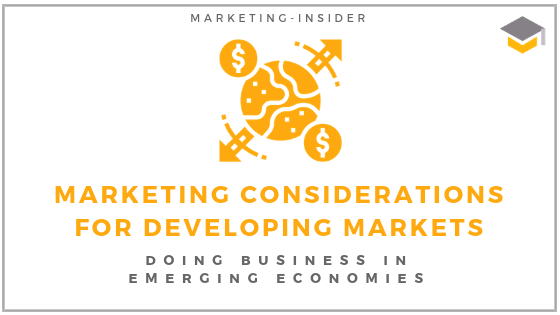Thanks to technology advancement and globalisation, companies are enabled to expand their businesses to international markets. Going global with your business gives access to increased sales and profits. The expansion will also create employment opportunities, improve the company’s prestige and allow business owners to overcome seasonal fluctuations in sales. However, a company that is aspiring to venture in a developing market should carry out in-depth research before setting up a marketing strategy because of pitfalls that can be very tricky and risky. Here are some of the marketing considerations for developing markets to protect your business and yourself from failing.
Table of Contents
1. The Economic Status Of Your Target Country
While some developing markets are very attractive for companies to venture into, clearly not all markets will be suitable for your business. In this case, get to know if your target market is attractive for you, and whether you are able to serve it effectively. For instance, can local consumers afford your products? How do income classes differ from the ones in your home market? Businesses should consider such differences because the spending power may differ greatly. As one of the main marketing considerations for developing markets, it is good to understand the real economic potential of your target market to avoid making losses. Companies can opt to provide a less sophisticated version of their products at a more affordable price. This move may need new manufacturing processes or equipment, and since it can be a very risky investment, it is good to do your homework well.
2. Cultural Factors
Every country is different in terms of culture, including values, attitudes, religious beliefs, languages, food and so on. While you may think that they do not concern you as a business person, the fact is that these differences play a great role in the business world. It is therefore important for marketers to consider such cultural differences because they can hinder growth and marketing efforts in some countries. When making marketing considerations for developing markets, remember to translate language for locals to ensure they understand everything about your brand to avoid rejection. Also, make sure that your products or services do not go against any of their beliefs and if they do, carry out possible alterations to ensure that people in your target developing country will accept it. Sometimes it’s not the product or the service itself that these people will say no to, but your marketing styles. Ensure that whatever you plan to do in the developing country, you do not bring social or cultural disturbances to the people. Cultural pitfalls are among the most common reasons for businesses to fail in developing markets.
3. Legal Considerations
Before you go ahead to commit your resources in a developing market, it is good to know about government attitudes towards foreign investors in that country. Get to know the laws that concern you as a foreign investor and weigh your options because some rules, laws, and regulations may be highly unfavourable for your business. Many developing countries have strict laws concerning foreign investment, and you will have to weigh your options to know if you can operate under such conditions or not. Most multinational companies consider demonstrating long term interest and therefore become actively involved in the wellbeing of people rather than focusing on selling products to them only. However, you may want to stay away away from countries with very weak regulatory systems too. A country that doesn’t have strong laws may have a highly volatile and vulnerable economy. As one of the main marketing considerations for developing markets, check the political stability of your target country as this is the only way to assure yourself of a stable political environment.
4. The Capability Of Your Company
Your target market can be very attractive, but one of the most important marketing considerations for developing markets should be whether your company is actually able to serve it effectively. You must ensure that you have enough resources to venture into that market. Assess whether you have all the resources required for this investment. You need to have extensive knowledge of the market, a portfolio of products meeting local needs, applicable technology, reliable partners and a sufficient capital base. Make sure you have everything you need before starting the expansion.
By taking care of these marketing considerations for developing markets, you can drastically increase your chances of success in developing markets and carry out international expansion effectively.
